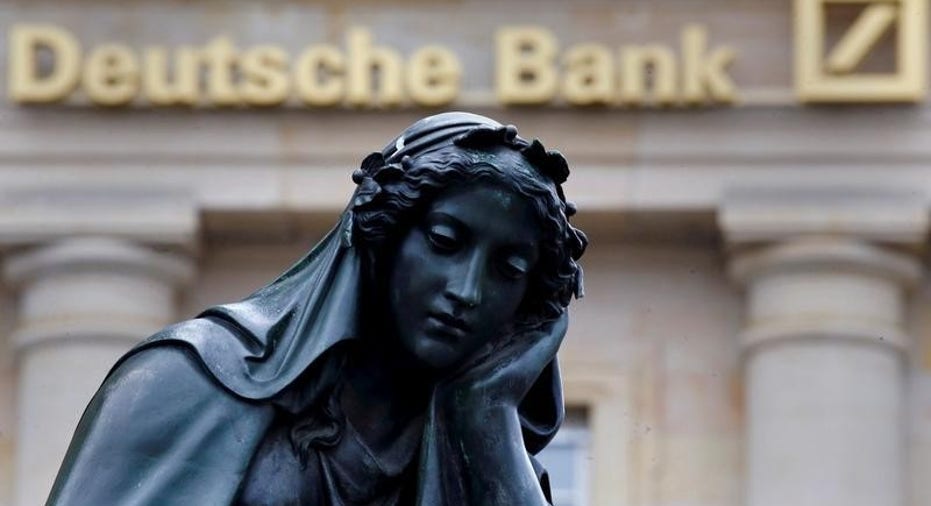As Deutsche struggles, German lawmaker says no more help for ailing banks

BERLIN – Germany will not help ailing lenders such as Deutsche Bank, a senior lawmaker in Chancellor Angela Merkel's conservative bloc said on Thursday, as resistance grew to any possibility of staging a rescue.
With Merkel meeting European Central Bank chief Mario Draghi on Thursday, Berlin has already flatly denied it is planning any repeat of the taxpayer-funded bailouts that Germany and other Western countries mounted during the global financial crisis.
This followed a newspaper report earlier in the week that the German government had made provisional plans to rescue Deutsche , which is fighting a fine of up to $14 billion from the U.S. Department of Justice.
Concerns over the stability of Germany's biggest bank pushed its shares to a record low on Tuesday. But Hans Michelbach, who heads the conservatives in the parliamentary financial committee, signalled that he would oppose any support.
Referring to the state rescue of banks on the brink of collapse after the 2008 crisis, Michelbach told Deutschlandfunk radio: "I cannot imagine that the state will repeat something like that."
A spokesman for the ECB declined to comment on the topics that Merkel and Draghi discussed in Berlin on Thursday. "They are talking about the euro area economy," he said.
Michelbach's remarks indicate a reluctance among politicians to back a group disliked by many Germans because of its pursuit of investment banking abroad that resulted in billions of euros of penalties for wrongdoing.
As Germany prepares for national elections next year, Merkel's popularity has sunk because of her open-door policy for migrants. Were Deutsche Bank to require state help, her standing as the chancellor who successfully steered Germany through the financial crisis could also be called into question.
Earlier, Sahra Wagenknecht, a prominent member of the opposition far-left Linke party, blamed the government for putting "a ticking time bomb in the lap of the taxpayer".
Norbert Spinrath, a lawmaker from the Social Democrats (SPD), the junior partners in Merkel's coalition, struck a more conciliatory tone about Deutsche, an issue he said had been discussed informally in the 'corridors' of the capital. "The mood is composed," he said. "We will have to figure it out."
BOOM YEARS
Deutsche is disputing U.S. plans to impose the fine over the misselling of mortgage-backed securities. The plunge in its shares has prompted speculation about who could help the bank were it to run short of funds.
Deutsche was once one of Europe's most successful players on Wall Street. Like many of its peers, it has faced a series of lawsuits that often trace back to the boom years before the crash. Its litigation bill since 2012 has already hit more than 12 billion euros ($13.5 billion).
Claims filed by individuals, companies and regulators against Deutsche, outlined in the bank's 2015 annual report, relate to misselling of subprime loans and alleged manipulation of foreign exchange rates or gold and silver prices.
Other lawsuits are for the rigging of the borrowing benchmarks Libor and Euribor, used to set the price of mortgages and derivatives.
In July the bank only scraped through European stress tests - designed to gauge its ability to withstand a crisis - and has warned it may need deeper cost cuts to turn itself around.
Michelbach also reiterated his criticism of the ECB's ultra low interest rates, a policy blamed by banks for their meagre profits.
Draghi rebuffed such claims, when answering questions from reporters. "If a bank represents a systemic threat for the euro zone, this cannot be because of low interest rates," he said.
($1 = 0.8914 euros)
(Additional reporting by Madeline Chambers; Writing by John O'Donnell; editing by David Stamp)



















